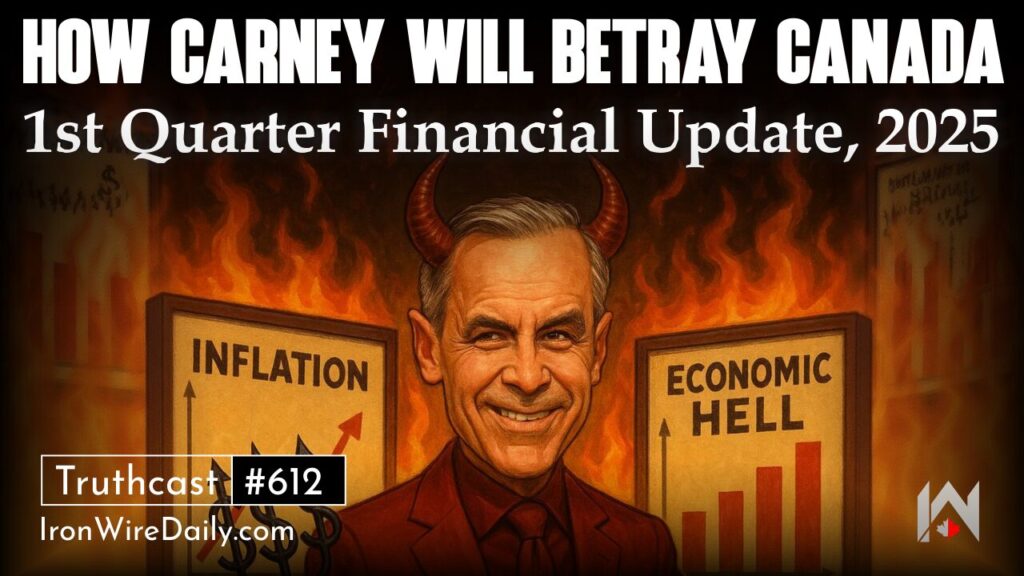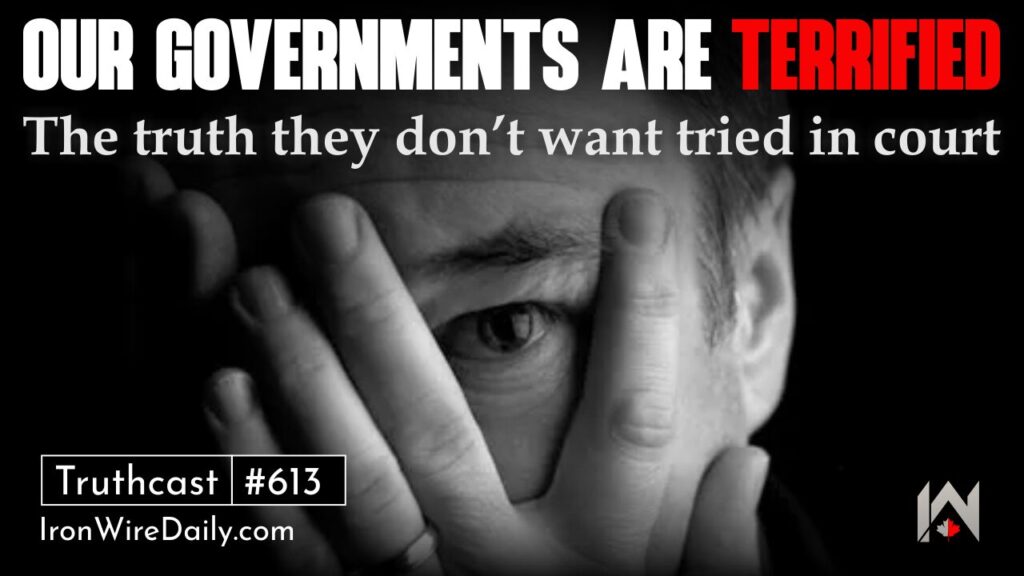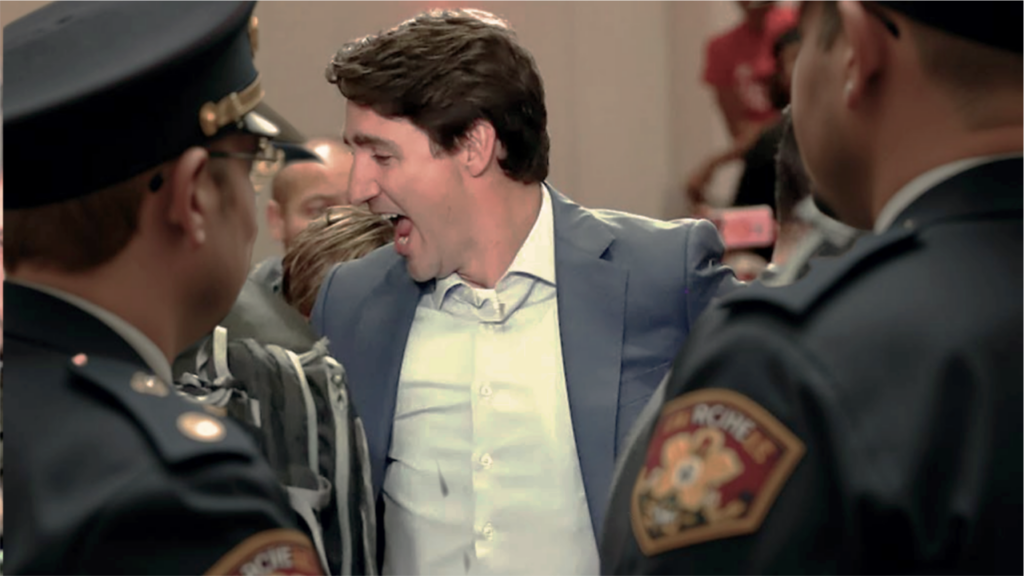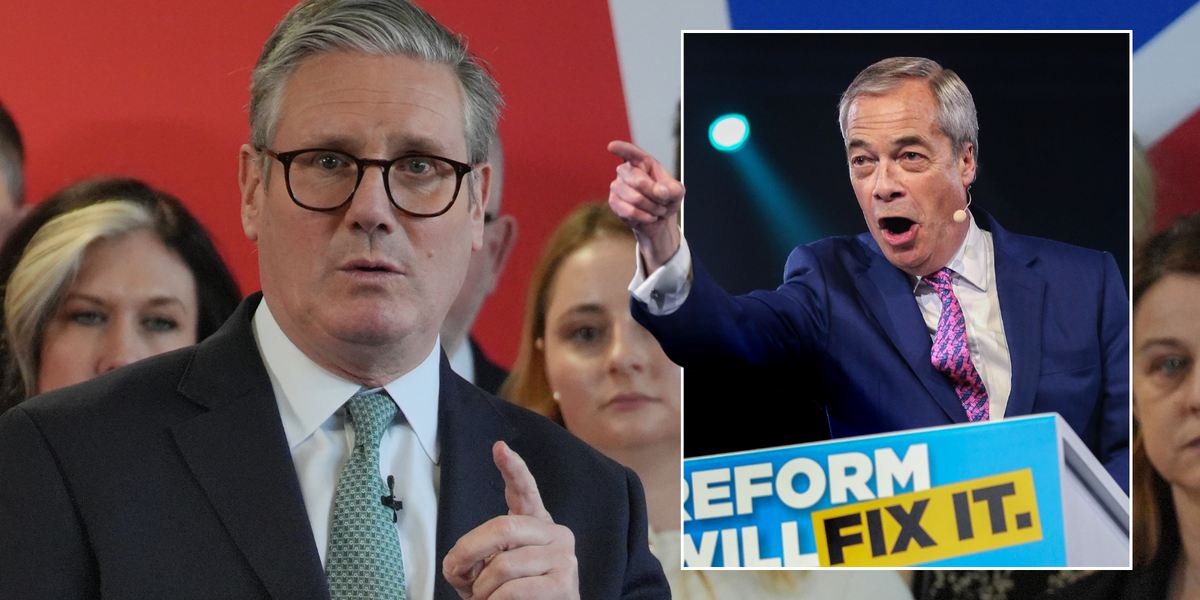Episode 2: “The 51st State”
Madison and Maycee Holmes
Want more Holmes?
Find them on Substack, Rumble and Youtube
Also you can contact the Holmes sisters directly at Connect@at-home-with-holmes.com
Get the Truth! Exclusive Interviews and News that mainstream media won’t report. https://ironwiredaily.com
Protect Your Assets from the Coming Economic Collapse. Buy precious metals at wholesale prices right here in Canada. https://info.newworldpm.com/154.html You can even transfer in your RSP. New World Precious Metals. You will also be supporting our efforts to bring Canadians the truth. We do receive a commission on purchases made through our affiliate link.
Get Sound Financial Advice. Adrian Spitters is a personal financial planner and author who successfully predicted both the dot-com crash and the crash of 2008, and also has access to many investment opportunities that other financial planners do not.
Adrian Spitters, Financial Consultant
Financial Advice for the Coming Economic Collapse
www.adrianspitters.com
adrian@adrianspitters.com
(604) 613-1693
Find and Join your LOCAL Freedom Community. We are building in-person freedom communities across Canada at https://freedomcoms.org. Joining is free and only takes a minute.
Get a truly Secure Phone. Above Phone! Purchase price includes a 45 minute online personalized orientation session. Stop the government and corporations from spying on you. https://abovephone.com/?above=101. Use code IRONWILL25 for $25.00 off any phone.
1 Comments
Leave a Comment Cancel Reply
You must be logged in to post a comment.
(0:00 - 0:06) Hi, I'm Madison Holmes. I am Maycee Holmes. And you're watching Holmes Squared. (0:06 - 0:09) That was so enthusiastic. That was so good. So good. (0:09 - 0:18) So good. Okay, so today, following up on our, this is our previous segment of Holmes Squared. Again, thank you, Will Dove, for the name and the segment. (0:19 - 0:33) The 51st state is what you said that we would be talking about. So there's a, there's an Alberta delegation going on. There's a delegation by multiple Albertans, and they're going to Washington. (0:35 - 0:48) And the people are the lead. There's a press conference for those who do not know. And the leading figures being Jeff Rath, who is a lawyer here in Alberta. (0:51 - 1:03) This is Mitch Sylvestre, or Sylvestre, I don't know how to pronounce that. He's also leading the delegation. This is Modry, Dr. Dennis Modry. (1:03 - 1:09) Yep. And then a former MP, LeVar Payne. And this is a very good press conference. (1:10 - 1:15) It's about one hour. So everybody tune in to that for more information. But Macy, I have a question. (1:16 - 1:33) Oh. I do. Why is there a delegation going to Washington? It's, why is that happening? Well, it's like, they're going, they're going for some information as to whether or not they can separate from Canada. (1:34 - 1:44) Alberta wants to separate from Canada? Well, I should probably specify. They're not trying to separate from Canada. I think they're trying to separate from something else. (1:44 - 1:58) They're trying to separate from something else. Well, then what are they trying to separate from? Well, good thing that you're asking the right questions. So if you guys haven't picked up on it yet, we are trying to paint a picture here. (1:58 - 2:15) And it is, why are we talking about Alberta independence? Well, because it's being talked about. Sure. But why? Why is it being talked about? And we think that a lot of what's going on out there is that, oh, Alberta wants to separate from Canada is a terrible thing. (2:16 - 2:40) Because you still may have sentimental value towards Canada as an image per se, which is totally fair. Yeah, because clearly the only reason that the 51st state came up is because Trump decided to make a facetious joke, right? Like, that's clearly the only reason why independence should be on the minds of people. No, that takes away context. (2:40 - 2:47) So I love how we're playing this. It takes away context and continuity of agenda. And that is something that we want to talk about today. (2:47 - 3:03) So Maddie, can you pull up the Matthew Arad article? I can absolutely pull up the Matthew Arad article. All right. So this article is called Mark Carney, technocrat, superstar, and eco warrior takes the helm of Canada. (3:03 - 3:18) So this was on the Matthew Arad Insights. And if for those of you who don't know, me and Maddie absolutely adore Matthew Arad's work. Yeah, he's the founder of the Canadian Patriot Press, which is this is his main website, along with the Rising Tide Foundation. (3:19 - 3:25) He's co founder of the Rising Tide Foundation. Cynthia Chung, his beautiful wife is the founder of the Rising Tide Foundation. But we love their work. (3:25 - 3:46) And so they came out with this article. And it was something that really rang true as to why this topic is even important to be talking about in the first place. Because, again, we're trying to make the argument that I don't think that Albertans per se are wanting to separate from Canada and from Canadian people. (3:46 - 4:04) What they're wanting to do is separate from something else. And this makes sense for those of us who have done a bit more research. So for those of you who are familiar with the WEF, right, the World Economic Forum, you've done your research well enough to know that there is people who have agendas. (4:04 - 4:27) And that are trying to push their agendas on to people like us, no matter what province you're in, within Canada, or even in the US, it's damn near all over the world that people don't necessarily agree with. No surprise there. So this article, you can pop it back up now. (4:27 - 4:51) Ah, we really like it. Because it's basically giving context as to what it is that Canada, or I guess, Alberta, and all of Canada, for that matter, should be wanting to separate from. And so it says, this is this, we'll be reading some segments from it, not the whole thing. (4:52 - 5:44) But this right here says Canada is a British weapon against America. So for context, we have to ask ourselves the question of what is the Canadian identity? So in here, it says, in the 19th century, Canada was recognized as a principal enemy of the USA, as Confederate intelligence had enjoyed vast patronage and support by the British Empire through a 12 of intelligence bases in Montreal and Toronto in Canada. These Confederate intelligence networks not only coordinated terrorist operations against the Union from the north, so terrorist operations that were set up from Canada via British funding in the war of independence that the US was trying to bring about against this imperial power, but additionally paid and directed John Wilkes Booth to murder Lincoln after the war's end. (5:45 - 6:10) Yeah, so that already for those of because this is knowledge that goes comes from Matthews. He has a four part series called The Untold History of Canada. And that opening statement of in the 19th century, so they're already telling us that Canada is a British weapon against America. (6:11 - 6:47) In the 19th century, for those who don't know, that's when the Civil War in the US was going about 1860s. Um, so during that, they're saying that there were British Empire intelligence agencies based in Montreal and Toronto. And there in those agent agencies, John Wilkes Booth was trained, brought up, and then sent to the US to murder him. (6:47 - 7:07) And that's after the war, of which we were also helping fund and arm. And the reason why this is important is not because it's necessarily let us now paint a nice picture for you as to why the British Empire bad. And we have our reasonings as to why we are not necessarily favorable to it. (7:07 - 7:29) But it's more so the fact that it's like, why? Why are you sending in assassins from Canada to go murder Lincoln of all people? You know, it's like, what did Lincoln ever do to you? You know what I mean? And then it's the same thing. It's actually it's happened quite a bit of times that we saw with the assassination of JFK. It's like good people in the US have been murdered. (7:29 - 8:02) And I'm sure that we already know that there's been lots of people from other countries who had good leaders who were also murdered. And again, the next question would be, well, again, who was that? But that's a different topic for a different time. So as it continues on, it just says that when Cecil Rhodes roundtable founded in 1902, became a driving force in shaping imperial grand strategy in order to recapture the lost colony, again, recapture the lost colonies of the Americas and establish a world federation under the city of London. (8:03 - 8:30) It was Canada that incubated hundreds of Rhodes scholars between 1907 through 1952, which then infiltrated the USA. So again, why is this important? We're trying to paint the picture of what is Canada's identity? How does it relate to why we have a bunch of Canadians? Okay, yes, we're all Burns. But why we have a bunch of Canadians right now saying I don't I want to separate. (8:31 - 8:50) Okay, so just bear that in mind as we paint this picture. Yeah, because the question is, if we're not separating from Canada, what are we what are we separating from? And Maycee brought up the WEF. So we're finding out if nobody has heard is the Cecil Rhodes roundtable movement founded in 1902. (8:50 - 9:08) People know of the WEF founded in 1971, along with the Club of Rome. And we know they're a think tank putting their intentions into our governments and sponsoring people and bringing people training people like Mark Carney. People know that that's a given fact. (9:08 - 9:14) Well, then go earlier. We have earlier think tanks. This one's the Cecil Rhodes roundtable movement. (9:15 - 9:28) This was 1902. So that's 69 years prior to WEF. Is that hard to believe if you already know the WEF is there? So now we have another one that came into play just much earlier. (9:28 - 9:42) Yes. And this plays into the WEF continuity of agenda because we're trying to work with what people are very much familiar with within the freedom community to kind of like help paint this picture. So where did you scroll to? Sorry. (9:43 - 10:19) So we have Canada being used by the British to kind of change the USA. So it says this fact was exposed by American journalist Eugene Griffin in the 1951 Chicago Tribune article titled Canada offers fine fields to Rhodes wards published as one of a series of 16 explosive articles between July 15th to 31st 1951 in Chicago Tribune. And it says scholars and other British educated Canadians are in a unique position to serve Britain through Canada's influence on Washington as a next door neighbor of the United States. (10:19 - 10:45) Canada acts as a connecting link between England and the United States, helping to hold the neighboring republic in line with the Dominion's mother country. When Gen MacArthur displeased Britain in Canada by his efforts to win the Korean War, Canada's Oxford educated minister for external affairs Lester B. Pearson explained that American Canadian relations had become difficult and delicate. MacArthur was fired the next day. (10:45 - 11:11) Pearson's foreign office staff is packed with Rhodes scholars. There are 23 among 183 staff officers or one out of every eight who were educated at Oxford University, England on the scholarships created by Cecil Rhodes, empire builder and diamond Mongol who wanted the United States taken back into Britain's fold. Other Canadian foreign office members also were educated in England, although not as Rhodes scholars. (11:12 - 11:43) Pearson went to Oxford on a, I think it says Massey or Macy scholarship endowed by a Canadian millionaire, Norman A. Robertson, a Rhodes scholar, sometimes called the most brilliant member of the British trained inner circle in the government's east block headquarters of the prime minister and the foreign office is another important figure in Canada's relations with Britain and the United States. He is clerk of the Privy Council and secretary to the cabinet and has been undersecretary of state and high commissioner to Britain. So, so that's a pretty significant figure. (11:44 - 12:10) Now, what that said there for people who maybe got lost in translation, this significant figure and multiple others after that were put in there, filtered through and vetted first by this Cecil Rhodes round table. That's not hard to believe. Again, if you already know the WEF who filters through people like Mark Carney, Justin Trudeau, it's even on the local level for us personally. (12:10 - 12:45) We found this out recently. There's a municipal group called Kickley and they informed us that there is a federation of Canadian municipalities program that even our local city of Calgary, you could probably check your local council too to see if it's in your municipality and they are subscribed onto a partnership for climate change program. And that's again a WEF sponsored and backed, created program. (12:45 - 13:23) So, the WEF is not only in the federal government, which we know and they vet members, but they've also infiltrated our local municipalities and they are doing the same thing. So, this article just expressed that they have been doing this, the British Empire in this specific case via Canada has been vetting and picking members of influential political positions of power since 1902 via this council, Cecil Rhodes round table movement. So, it's another way of infiltration and Canada has been doing the same thing is what that's saying. (13:23 - 13:30) Yep. And if we continue on, so we already know that it's saying that this has been going on for a while. So, we can kind of skip down. (13:30 - 13:36) Let me just take a look. Okay. We can kind of skip down for here for a second. (13:36 - 14:25) This was, I'll just briefly explain it so I don't have to read it all, but it was basically just saying that there was at one point a plan, I believe, for the US, that the US drafted called War Plan Red and it was how the US would invade Canada. But it was funny enough, it was actually a defense mechanism because the first thing that was schemed was called Defense Scheme Number One, and it was actually a draft on how Canada would invade the US and no surprise by British figures once again, because again, we're trying to explain the fact that it's like there's something else within Canada that we need to pay attention to. And it clearly has some gripes with whatever the American concept was and slash still could be a bit more of a larger topic to try and touch on. (14:26 - 14:31) But for now, let me just take a look here. Right. Okay. (14:31 - 14:46) So I'll just read this part here where it says the Green Agenda's infiltration into US foreign and energy policy considerations was also driven in large measure through the influence of Canada's Murray Strong. So again, Canada's infiltrated. So we got this guy named Murray Strong. (14:46 - 15:25) All right. From 1963 to 1970, Strong oversaw a vast reorganization of the Liberal Party, even bragging to his biographer, Elaine Dewar in 1994, that he was on the selection committee that brought Fabian Society agent Pierre Trudeau into politics in 1963. From 1965 to 1967, Strong ran Canada's Ministry of Foreign Affairs, founded Canada's International Development Agency, CIDA, which transformed the philosophy of international aid from assisting poor nations to build full spectrum economies into predatory lending tied to conditionalities. (15:26 - 15:36) More on that we'll touch on in later episodes that has to do with like the WWF, but it also I'll continue. He also mentored a young Klaus Schwab. Everybody knows Klaus Schwab. (15:37 - 16:10) Co-founded the World Economic Forum in 1971, chaired the first UN Forum on Population in 1972, served on the Bilderberg Group steering committee and crafted a worldview which became known as the Green New Deal and Agenda 21 launched at the Rio Summit in Brazil in 1992, which he also chaired. Now, this is a very important section because so we just connected, you know, there's some similar aspects and intentions from the WEF, World Economic Forum, 1971. So Murray Strong was a part of that. (16:10 - 16:42) And we just discovered 1902 is when the Cecil Roundtable movement was put together to, again, still act as put Canadian figures and other figures in positions of power to subvert the United States and using Canada. And this connects also to so Murray Strong helped founding the World Economic Forum and mentored Klaus Schwab. Well, one degree of separation. (16:44 - 16:59) You see Fabian Society mentioned here and Pierre Trudeau. Fabian Society was founded in well, there's a couple. So there was it was originally founded in Britain, London in 1885. (17:00 - 17:22) So that's that's one connection right there. But then there was they expanded because, again, they're using other countries to subvert other countries. So they had a Fabian Society in 1885 in Britain wasn't enough in order to keep their this subverting other people and putting figures in places of political power, not just in the UK. (17:22 - 17:45) Well, then they want political figures, as we see in Canada and the United States, that they also have vetted and sponsored. This being the case, they did Fabian Society in the United States, which their version was in 1921. And then Canada, we got ours, Canada's Ministry of Foreign Affairs. (17:47 - 17:54) That's our version of the Fabian Society. It's the Canadian version. So all of these are think tanks. (17:55 - 18:10) And you can have the same person, Maurice Strong, in the WEF, in the Fabian Society. They're all in the Bilderberger Group. So all of these are one degree of separation. (18:10 - 18:30) You can have this one person in all four of those think tanks. And when you look at people like Mark Carney, who was the governor of the Bank of Canada, he wasn't just the governor of Bank of Canada, he was also the governor of the Bank of England. So you look one person, multiple think tanks, and all of them have similar agendas. (18:31 - 18:45) So just try and connect them all in your brain. Yeah, so then it says, today, the spiritual heir of Maurice Strong and the roundtable movement is being set up to take control of Canada. I speak, of course, of Mark Carney. (18:45 - 18:55) Now, before I go on to that, they mentioned roundtable movement. So again, this is just another thing that we need to have our brains wrapped around. Mark, the spiritual heir being Mark Carney of Maurice Strong and the roundtable movement. (18:56 - 19:09) So I have a quote from someone actually from the roundtable movement that I think I'll just bring up right here. And this was Lord Alfred Milner in 1909. And the reason why this is important, because again, we're painting the picture of these think tanks. (19:10 - 19:33) Well, we have to figure out what are these think tanks thinking? And then how is it that these individuals are related to all of these think tanks, which Maddie just specified one individual can be connected like to so many of them, like four branches, right? But again, what are these think tanks promoting? Exactly. Right. So this was one individual who was talking about the relationship between Canada, the US and Britain. (19:33 - 20:11) And so just when you guys think that the British Empire all of a sudden just doesn't exist anymore, and it just went away, then how come we have someone like Mark Carney in 2025 from the World Economic Forum from the history of all these different think tanks coming in? Well, maybe it's because there's still individuals that think like this today. Maddie read the quote. As between the three possibilities of the future, there is one closer imperial union to union with the US and three independence. (20:11 - 20:31) I believe definitely that number two is the real danger. I do not think the Canadians themselves are aware of it. They are wonderfully immature in political reflection on the big issues and hardly realize how powerful the influences are. (20:32 - 21:23) On the other hand, I see little danger to ultimate imperial unity in Canadian nationalism. On the contrary, I think the very same sentiment makes a great many, especially of the younger Canadians, vigorously and even bumptuously assertive of their independence, proud and boastful of their greatness and future of their country and so forth, would lend themselves tactfully handled to an enthusiastic acceptance of imperial unity on the basis of partner states. This tendency is therefore, in my opinion, rather to be encouraged, not only as safeguard against Americanization, but as actually making it the long run for a union of all the Britons. (21:26 - 21:35) Okay, so again, right there, we just read you a quote that's saying. Lord Alfred Milner was a part of the Roundtable. He was one of the founders of the Roundtable. (21:35 - 21:51) So he's showing you that the intention of the groups like the Roundtable, the Fabian Society, also things like the World Economic Forum. This is their intention. Just just so you know, this is in the what an interesting quote. (21:51 - 22:05) These people, that is their goal. So their goal is not to bring. Not to just randomly put figures together. (22:05 - 22:33) It is to make and expand the Britain Union, this North American Union that we're starting to hear more and more of. And let's just specify it's not just about British people when she says North American Union, that's a better way of putting it is a sense of like still what is this hegemony right now? Because this just sounds to me still like colonization and like imperial rule. And that's some people are like, well, that was a good thing. (22:33 - 23:09) And like colonizing and there's like pros and cons. It's like, I get that. But why are you making secret societies or I guess not so secret, really? But why are you making these societies that are, I guess, having this mode of attention, which is like everybody needs to be under my subjugation? And it literally said there where it's like we would rather use the facade of Canadians feeling like they have nationalism to conquer them instead of having them join the U.S. And so, again, why they're specifically targeting the U.S. is a bit more historical context that we're probably going to have to tease you into a different segment on. (23:10 - 23:29) But there's it plays into, again, this question of actually, it plays very well into the question of why Canadians of burdens are wanting to separate and potentially either become 51st state or just straight up independent. It plays it plays really well, actually, so that that even our actions kind of already answer that question. Oh, yeah. (23:29 - 24:02) Because what are we separating from? Like, and that's the thing. What we just read to you, this fella, this Lord Alfred Milner, he says, and this is this is how majority of the members in these think tanks look at Canadians as these, he said, immature and we don't consider the bigger ideas. They are looking at us Canadians and going, they don't realize where they are on the map. (24:02 - 24:15) The fact that they we are being used, they are putting things on our plate and expecting us to eat it. We will eat the bugs. They are expecting us to eat the bugs and look at it as if it's a steak. (24:15 - 24:30) That is literally what they are doing. So there are two Canadian identities here. There's the one that we all, you know, when I think of Canadian identity, a lot of people watching the show will agree with me. (24:30 - 24:44) We like to reflect on, you know, the trucker movement. That Canadian flag was suddenly a symbol of the rebellion. You know, it was instead of Vive la France, it was Vive la Canada. (24:44 - 25:20) And there was this real pride, not this national pride that they are that Lord Alfred Milner created for us to have an actual one, because all of these supposedly polite hockey, maple syrup loving people, that that's a very innocent identity that we all garnered to fight for the freedoms and to push back against an overreaching government. We all came together on that fact, which is what the United States was founded on. So we got a little bit of a taste about why the United States wanted out of Britain in the first place. (25:21 - 25:56) That is a Canadian identity that I am on board with. And most of the people watching the segment, watching, following the Iron Wire can hop on board with. I think that to add to that, like, so now we can transition a bit more into the delegation and why they're doing what it is that they're doing, because what Maddie just said, if I was in the if I was in the US back in that time and I was under a feudalistic system where I literally had to slave labor in order for my goods to get sold to Britain, they get manufactured, I buy them back for and I'm just now in this cheap labor system. (25:57 - 26:07) I'm not actually flourishing. My economy is doing terrible and I have to rely on like slave labor. And it's just the manipulation of just what are the systems, regardless of who's the one doing it. (26:07 - 26:24) It so happened to be Britain. And it still so happens to be them to some degree. But the part is, if we were Canada, if we were playing a role in the importation of the US, and that means that the US today is also practicing some pretty imperialistic bullshit, right? So it doesn't matter where you are. (26:24 - 26:39) There are elements where this could be happening. But it is happening. So the thing is, is why now is Alberta as a 51st state being a topic that is important for people to be talking about whether or not you're Albertan or Canadian. (26:39 - 26:55) If you're Canadian, you should be thinking about this too. Why? Because as Albertans, we're like we want to separate because we have just shown that through millennia through decades, they have been they have been putting in their puppets. Mark Carney is one of them. (26:55 - 26:59) Trudeau was one of them. His dad was one of them. Pierre Polivier. (27:00 - 27:11) I'm not going to trust that guy. I'm just saying like, I don't care. Where did you come from? Because there's been a system set up to bring you in here to I don't want to swear, but mess with us. (27:12 - 27:35) You know what I mean? And it's actually showing because we can barely in Alberta afford at me and Maddie to buy a house. Okay, this is a legitimate reality. So all we're trying to paint the picture of is what is physically happening for stupid reasons like a carbon tax, right? Equalization payments that we have to take on as Canadians. (27:35 - 27:57) Sure. And as Albertans as people, people, we have to take this on and for what we already have shown you guys have already shown that you've done beautiful work and diligence and understanding why the WF I guess sustainable development goals in the UN sustainable development goals. Why all that bullshit, right? So you've done really well. (27:57 - 28:09) So now let's just take it a bit of a step further where it's like, that's why that's why we're wondering what what are we suffering from? Not Canadian people. Canadian people are beautiful people. They're people. (28:09 - 28:21) I love people. So I I'm not separating for people. I'm separating from a messed up federal system that has been going on for a long time negotiating of which is basically zero. (28:22 - 28:42) And because the rest of Canada is not necessarily the most educated on this topic. And Albertans are trying to do their damnedest to get the most educated on this topic. We're trying to lead by example where it's like, what can we do if we decided to threaten separation? What is the US hence this delegation? What's their support? What's their take? Right? They've been dealing with it too. (28:43 - 28:48) In part, they're tainted by it too. So we could be walking into a trap by separating. Sure. (28:48 - 29:22) But we're trying to put damned if you do damned if you don't, we're trying to figure out what is it? How can we get back individual autonomy? And how may that lead by example for other places in Canada to also do the same? Because we don't want to separate from each other. We want to separate from this top system of control. Yeah, if there if there are two identities of Canada, where we, as Jeff said, in the delegation, Jeff Roth, he said, we're not separating from Canada, Canada has separated from us. (29:22 - 29:42) And that's not Canada, as in our neighbours in Saskatchewan, or Montreal, or even some of those in Quebec who have fought for sovereignty as well. We're, we're separating from what we just showed you guys, there are clearly two versions of Canada. And one of them we can identify with. (29:42 - 30:02) And the other one, we don't want to be the only ones. Alberta's Albertans shouldn't be the only ones thinking about separating from that version of Canada, all of Canada. Should want to separate from what we just showed you that that puppeteering, that ongoing thing, and there's a lot of research to go into it. (30:02 - 30:21) But all of Canada, we, we want everybody to come with us away from whatever that imperial thing is. Yes. And I think that the best way to end this off, because we now are at our 30 minute mark, the best way to end this off, is if you want to understand a bit more of the abuses, and Jeff Rath is a lawyer. (30:21 - 30:38) So he's gotten a bit more in terms of like, how it's really why negotiating with this beast is going to be really harder than just straight up, can we separate. And so and hopefully it'll follow suit for the rest of Canada, maybe help us out. So that way we can put more pressure on this. (30:38 - 31:07) Again, we're putting pressure on something else and what we just painted for the last 30 minutes. So one of the so some of the reasons why Alberta independence is important, according to Jeff's initiative is presented in the APP. So the APP, the Alberta Prosperity Project, is a educational group that is trying to, I guess, paint you a bit more the logistical picture as to why Alberta specifically wants to get out of this mess. (31:07 - 31:35) But again, this is gonna this can apply to not every issue can apply to all the provinces, because Alberta does face things like the problem of equalization payments and such. But things like the the carbon tax or the capital gains tax or GST and just more other things can apply maybe to your province, perhaps. The whole point is just take a look at how you're being used and abused. (31:36 - 31:52) And Alberta is. So if you want to know how Alberta is being used and abused, and why it is that we want to leave to better understand our context, to better understand why maybe you should be thinking about this thing, right? Watch the delegation, watch the delegation video that Maddie showed you guys in the very beginning. Yeah, this one. (31:53 - 31:59) Yeah. And go to Alberta prosperity project.com. Yep. Yeah, that'll, that'll do. (31:59 - 32:20) And if you want to if you're enjoying, I don't think anybody should really be enjoying the digging into all of the think tanks that are controlling us. But if if you want to start getting, you're doing your own research ahead of time, because our segments is only once a week, and we only have 30 minutes. So there's too much to cover. (32:21 - 32:37) That again, the article that we read from today was from Matthew Aretz insights, you can follow his sub stack. But he also has a whole book series called the Untold History of Canada. And I'm trying to pull it up here. (32:37 - 32:42) Yeah, yeah. So it's a four part series. You could get those. (32:43 - 32:49) And that'll also start the journey. Because there are there are two Canada's. Yeah. (32:49 - 32:57) And there are two everything. There are two everything to us is to Russia's to China's. But that's all we can cover. (32:58 - 33:01) That's all we can cover today. But it was a lot. I think that was good. (33:02 - 33:07) Thank you everyone for taking the time to listen to it. Thank you, Will, again for the segment. And thank you to everybody. (33:07 - 33:18) We've already been we only did one segment. And we already have emails coming in and people saying, thank you for your thoughts. Thank you for being an inspiration. (33:19 - 33:37) Thank you for challenging the narrative and local people too, that are saying, Hey, are you going to the Sean Newman event, the cornerstone event happening in May? Are we gonna? We're gonna see you there. You guys involved in Edmonton politic. So people are already we love emails. (33:37 - 33:44) So if you want to email us, go ahead. Oh, yeah, that's, that's always appreciative. I really love how we're all trying to figure out how to get good together. (33:44 - 33:52) So I think that's a good way to end off. I don't know necessarily what we're going to talk about next week. But I'm sure it may or may not be related to this and maybe an extension. (33:53 - 33:59) But yeah, so thank you guys so much. Yeah. How do we end? We say like, that you you've watched. (34:00 - 34:07) You've watched Holmes Squared. Okay, ready? You've watched Holmes Squared. Bye.












Merci from Montreal